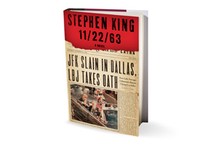
Photo: Lara Robby/Studio D
1 of 46
11/22/63
By Stephen King
849 pages;
Scribner
The reason narrative tricks sometimes become clichés is that they work. Consider Stephen King's 11/22/63, an 864-page novel about an otherwise unremarkable high school teacher who travels back in time to try to prevent the assassination of JFK. Sound hokey? Well, it is, a little, but once Jake Epping falls through the proverbial rabbit hole (here, an opening in the pantry of his favorite Maine diner), you almost forget the gimmick, so skillful is King at rendering an era he clearly loves. A student of American history—King loads the book with information about JFK's killer, Lee Harvey Oswald, and many other real-life figures, events, and controversies—he is also a perceptive chronicler of a more innocent time in which ID checks and terror alerts didn't exist. Not that everything back in the mid-20th century was all hunky-dory; there were psychopaths, wife abusers, and nasty gossips, even offline. And controlling the world around you, Jake learns, was no easier then than now. But if you haven't read King since, say, The Shining, your readometer is due for a reset. His work is proof that great storytelling is timeless.
— Sara Nelson


